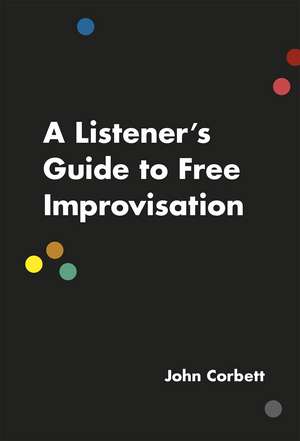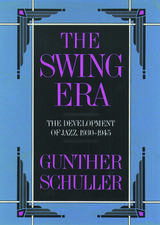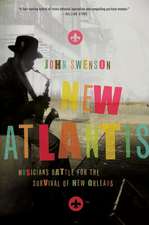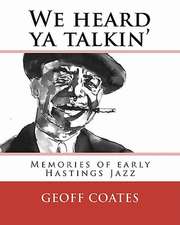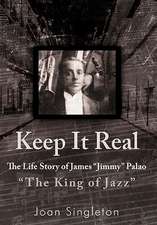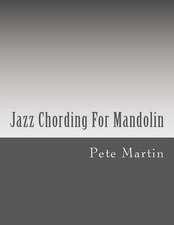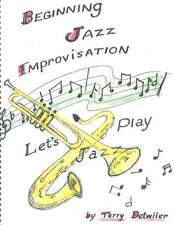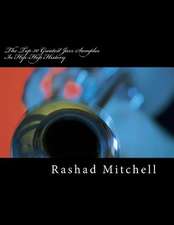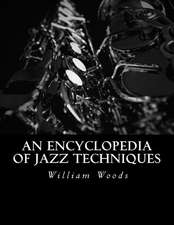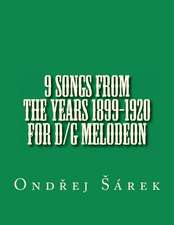A Listener's Guide to Free Improvisation: Emersion: Emergent Village resources for communities of faith
Autor John Corbetten Limba Engleză Paperback – 31 mar 2016
Improvisation rattles some listeners. Maybe they’re even suspicious of it. John Coltrane’s saxophonic flights of fancy, Jimi Hendrix’s feedback drenched guitar solos, Ravi Shankar’s sitar extrapolations—all these sounds seem like so much noodling or jamming, indulgent self-expression. “Just” improvising, as is sometimes said. For these music fans, it seems natural that music is meant to be composed. In the first book of its kind, John Corbett’s A Listener’s Guide to Free Improvisation provides a how-to manual for the most extreme example of spontaneous improvising: music with no pre-planned material at all. Drawing on over three decades of writing about, presenting, playing, teaching, and studying freely improvised music, Corbett offers an enriching set of tools that show any curious listener how to really listen, and he encourages them to enjoy the human impulse— found all around the world— to make up music on the spot.
Corbett equips his reader for a journey into a difficult musical landscape, where there is no steady beat, no pre-ordained format, no overarching melodic or harmonic framework, and where tones can ring with the sharpest of burrs. In “Fundamentals,” he explores key areas of interest, such as how the musicians interact, the malleability of time, overcoming impatience, and watching out for changes and transitions; he grounds these observations in concrete listening exercises, a veritable training regime for musical attentiveness. Then he takes readers deeper in “Advanced Techniques,” plumbing the philosophical conundrums at the heart of free improvisation, including topics such as the influence of the audience and the counterintuitive challenge of listening while asleep. Scattered throughout are helpful and accessible lists of essential resources—recordings, books, videos— and a registry of major practicing free improvisors from Noël Akchoté to John Zorn, particularly essential because this music is best experienced live.
The result is a concise, humorous, and inspiring guide, a unique book that will help transform one of the world’s most notoriously unapproachable artforms into a rewarding and enjoyable experience.
Corbett equips his reader for a journey into a difficult musical landscape, where there is no steady beat, no pre-ordained format, no overarching melodic or harmonic framework, and where tones can ring with the sharpest of burrs. In “Fundamentals,” he explores key areas of interest, such as how the musicians interact, the malleability of time, overcoming impatience, and watching out for changes and transitions; he grounds these observations in concrete listening exercises, a veritable training regime for musical attentiveness. Then he takes readers deeper in “Advanced Techniques,” plumbing the philosophical conundrums at the heart of free improvisation, including topics such as the influence of the audience and the counterintuitive challenge of listening while asleep. Scattered throughout are helpful and accessible lists of essential resources—recordings, books, videos— and a registry of major practicing free improvisors from Noël Akchoté to John Zorn, particularly essential because this music is best experienced live.
The result is a concise, humorous, and inspiring guide, a unique book that will help transform one of the world’s most notoriously unapproachable artforms into a rewarding and enjoyable experience.
Din seria Emersion: Emergent Village resources for communities of faith
-
 Preț: 144.99 lei
Preț: 144.99 lei -
 Preț: 133.99 lei
Preț: 133.99 lei - 9%
 Preț: 352.50 lei
Preț: 352.50 lei -
 Preț: 146.50 lei
Preț: 146.50 lei -
 Preț: 208.32 lei
Preț: 208.32 lei -
 Preț: 156.84 lei
Preț: 156.84 lei -
 Preț: 115.53 lei
Preț: 115.53 lei -
 Preț: 548.71 lei
Preț: 548.71 lei - 8%
 Preț: 346.31 lei
Preț: 346.31 lei - 8%
 Preț: 360.28 lei
Preț: 360.28 lei -
 Preț: 216.90 lei
Preț: 216.90 lei -
 Preț: 101.43 lei
Preț: 101.43 lei -
 Preț: 215.52 lei
Preț: 215.52 lei -
 Preț: 185.37 lei
Preț: 185.37 lei - 8%
 Preț: 563.24 lei
Preț: 563.24 lei -
 Preț: 179.04 lei
Preț: 179.04 lei -
 Preț: 138.81 lei
Preț: 138.81 lei -
 Preț: 273.93 lei
Preț: 273.93 lei -
 Preț: 127.89 lei
Preț: 127.89 lei - 9%
 Preț: 353.24 lei
Preț: 353.24 lei -
 Preț: 176.49 lei
Preț: 176.49 lei -
 Preț: 94.22 lei
Preț: 94.22 lei -
 Preț: 144.80 lei
Preț: 144.80 lei -
 Preț: 126.25 lei
Preț: 126.25 lei -
 Preț: 67.35 lei
Preț: 67.35 lei -
 Preț: 163.52 lei
Preț: 163.52 lei -
 Preț: 138.26 lei
Preț: 138.26 lei -
 Preț: 182.98 lei
Preț: 182.98 lei - 18%
 Preț: 502.35 lei
Preț: 502.35 lei - 18%
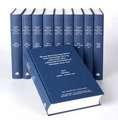 Preț: 2261.34 lei
Preț: 2261.34 lei -
 Preț: 279.55 lei
Preț: 279.55 lei -
 Preț: 116.07 lei
Preț: 116.07 lei -
 Preț: 208.55 lei
Preț: 208.55 lei -
 Preț: 167.85 lei
Preț: 167.85 lei -
 Preț: 160.63 lei
Preț: 160.63 lei -
 Preț: 183.89 lei
Preț: 183.89 lei - 9%
 Preț: 352.77 lei
Preț: 352.77 lei -
 Preț: 307.55 lei
Preț: 307.55 lei - 12%
 Preț: 290.56 lei
Preț: 290.56 lei - 8%
 Preț: 311.68 lei
Preț: 311.68 lei -
 Preț: 120.81 lei
Preț: 120.81 lei -
 Preț: 229.92 lei
Preț: 229.92 lei - 6%
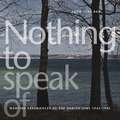 Preț: 324.95 lei
Preț: 324.95 lei -
 Preț: 145.41 lei
Preț: 145.41 lei -
 Preț: 152.07 lei
Preț: 152.07 lei -
 Preț: 186.09 lei
Preț: 186.09 lei - 18%
 Preț: 348.59 lei
Preț: 348.59 lei -
 Preț: 302.76 lei
Preț: 302.76 lei - 8%
 Preț: 565.01 lei
Preț: 565.01 lei
Preț: 106.35 lei
Nou
Puncte Express: 160
Preț estimativ în valută:
20.35€ • 21.17$ • 16.80£
20.35€ • 21.17$ • 16.80£
Carte disponibilă
Livrare economică 24 martie-07 aprilie
Livrare express 07-13 martie pentru 24.48 lei
Preluare comenzi: 021 569.72.76
Specificații
ISBN-13: 9780226353807
ISBN-10: 022635380X
Pagini: 112
Dimensiuni: 108 x 159 x 28 mm
Greutate: 0.16 kg
Ediția:1
Editura: University of Chicago Press
Colecția University of Chicago Press
Seria Emersion: Emergent Village resources for communities of faith
ISBN-10: 022635380X
Pagini: 112
Dimensiuni: 108 x 159 x 28 mm
Greutate: 0.16 kg
Ediția:1
Editura: University of Chicago Press
Colecția University of Chicago Press
Seria Emersion: Emergent Village resources for communities of faith
Notă biografică
John Corbett is a writer, producer, and curator based in Chicago who has written extensively on jazz and improvised music. A regular contributor to DownBeat magazine, he is the author of several books, including Extended Play: Sounding Off from John Cage to Dr. Funkenstein and Microgroove: Forays Into Other Music.
Cuprins
Preface
Introduction
Preparing to Go into the Field
Range and Diversity
Fundamentals
Rhythm: The Hurdle
Duration: Another Hurdle
Basic Identification: Who Is Doing What?
Entrances and Exits: Mapping the Flow of Events
Interaction Dynamics: The Core
Dynamics Dynamics: Passive-Aggressive Improvising
Transitions: Observing How the Music Changes
Structure: The Butcher Shop
Personal Vocabulary: Each unto Themselves
Advanced Techniques
On Watching While Listening
Live or Memorex?
Kindling: 20 Starter Records for Your Improvised Music Collection
Once vs. Ongoing
The Level of Mystery
The Ambiguous and the Unresolved: Is Tony Dead?
The Rule of Threes
Dancing Between the Hypothetical Poles
Poly-Free
Kindling II: 20 Classic Poly-Free Records
Distraction and Sleep
Thinking and Chewing Gum (at the Same Time)
You and the Night and the Music: Audience Participation
Additional Reading: Seven Great Books (Plus One DVD)
A Little Rouge, a Touch of Blush
On the Moral Superiority of Improvised Music
Life List: A Selected Checklist of Major Living Free Improvisors
Introduction
Preparing to Go into the Field
Range and Diversity
Fundamentals
Rhythm: The Hurdle
Duration: Another Hurdle
Basic Identification: Who Is Doing What?
Entrances and Exits: Mapping the Flow of Events
Interaction Dynamics: The Core
Dynamics Dynamics: Passive-Aggressive Improvising
Transitions: Observing How the Music Changes
Structure: The Butcher Shop
Personal Vocabulary: Each unto Themselves
Advanced Techniques
On Watching While Listening
Live or Memorex?
Kindling: 20 Starter Records for Your Improvised Music Collection
Once vs. Ongoing
The Level of Mystery
The Ambiguous and the Unresolved: Is Tony Dead?
The Rule of Threes
Dancing Between the Hypothetical Poles
Poly-Free
Kindling II: 20 Classic Poly-Free Records
Distraction and Sleep
Thinking and Chewing Gum (at the Same Time)
You and the Night and the Music: Audience Participation
Additional Reading: Seven Great Books (Plus One DVD)
A Little Rouge, a Touch of Blush
On the Moral Superiority of Improvised Music
Life List: A Selected Checklist of Major Living Free Improvisors
Recenzii
“A much-needed book for the open-minded listener—a well-written volume from jazz critic John Corbett—and one that’s bound to widen your ears to a whole new realm of listening! The book’s pocket-sized—maybe so that you can sneak it into a club when visiting a free jazz concert—and it’s written in a style that’s both personal, but very directive—with a full understanding of the complexities that come into play when listening to improvised music, and a guide towards facing some of the more difficult challenges involved! Corbett clearly loves this music, but without any sort of high ideals—none of the too-cool-for-school modes that are usually standard with the avant garde, and instead this very down to earth approach that shows the listener that they’ve got all the tools needed to enjoy the music themselves. The goal here (one we can totally endorse) is to bring the listener face to face with new and challenging sounds—but in a way that allows them to instantly contextualize them too—yet without having to carry years of jazz or musical experience into the process. The book is divided up into easy-to-digest sections—and penned with a surprisingly warm style too.”
“It took me years and lots of listening to understand free improvisation, and in the beginning Corbett was a big help for me. This handy book breaks down the basics of free improvisation, a theoretically non-idiomatic practice where musicians get together with nothing planned and simply make music spontaneously, focusing on interaction and largely dispensing with the qualities we expect in music—fixed structure, melody, regular rhythms, standard harmony. Free improvisation is about sound and interplay, though that doesn't quite sum it up. Corbett mostly does without name dropping and jargon—he designed his book for the novice, and he takes pains to keep things clear and approachable, even if what he's writing about is anything but accessible to most listeners.”
“The perfect example of what any field guide to music (or any other art form) should be. Small enough to fit in a pocket at barely over 4″ x 6″, the book is a practical guide for those new to free improvisation, though there is plenty of information for an experienced listener to pick up something new. . . . This book will undoubtedly be useful to anyone who is interested in improvised music or even music in general. These listening techniques could easily be applied to most forms of music. It would be nice to see this book be adopted as a text for music appreciation and history classes. I wish this book had been around when I started listening to and performing free improvisation. This is an essential text for the next generations of listeners.”
“A refreshingly pragmatic book. . . . As a primer, it’s a valuable guide and even seasoned listeners will find it useful to be reminded what distinguishes free improvisation from other music and the kinds of things to which they should be alive.”
“Lays down a golden road to understanding free improvisation. . . . A Listener’s Guide is, essentially, and in the best way possible, a popular how-to manual from a master who has spent years in the field. Reading Corbett is like spending an afternoon with your favorite uncle and his cabinet of booze. By the end, you won’t necessarily know the names of the different bourbons, but you’ll know what tastes good.”
“It’s hard enough to put music into words but even harder when it’s created without preconceived plans. Kudos, then, to John Corbett for his insight into how one can gain deeper understandings of and appreciation for such music. Written in a pithy, metaphor-steeped style, Corbett’s book is humorous and engaging; he’s having a bit of fun with a subject about which he cares deeply. Fond of enlarging on his metaphors, as when he shows the various ways the book is like a field guide for birdwatching, he’s equally content to string a series of mixed metaphors together, thereby acknowledging the imprecise nature of such allusions, all merely parts, hints, of the bigger ‘truth’ he wants to illuminate.”
“It’s hard enough to put music into words, but even harder when it’s created without preconceived plans. Kudos then to John Corbett for his insight into how one can gain deeper understanding of and appreciation for such music.”
“A Listener’s Guide to Free Improvisation expertly navigates music that can seem thoroughly foreign and intimidating. Yet Corbett handles the material with grace and humor, intelligence and curiosity, in prose that unlike some writing on the subject, is easy to read and accessible to everyone. . . . a strangely soothing read, finding beauty and order amidst seeming chaos like a Zen master who describes a blade of grass bending but not breaking in the wind.”
“Corbett has been listening to free improvisation for years and beyond that, has organized shows, curated festivals, and even engineered recording sessions for the music. Now, with A Listener's Guide to Free Improvisation, he has attempted to build a bridge to potential listeners by writing a kind of guide for the perplexed on how to listen to music that doesn't follow the conventions of ordinary song. . . . The advice he offers is practical and illuminating.”—Perfect Sound Forever
